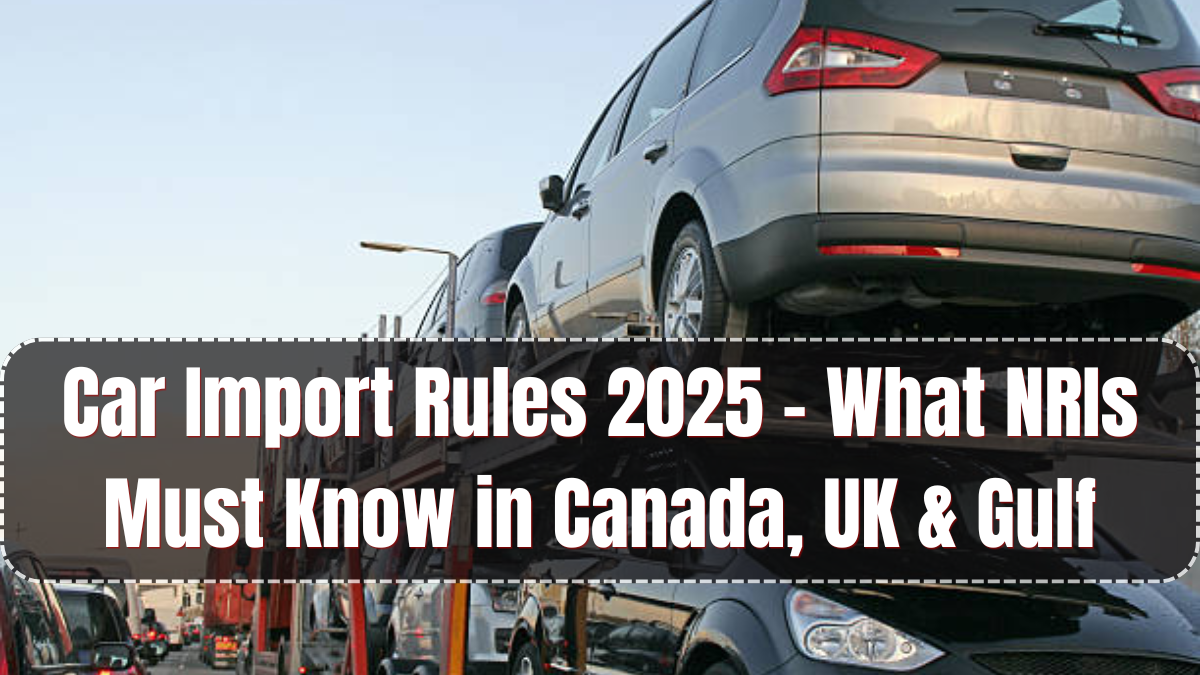In 2025, Non-Resident Indians (NRIs) looking to ship their personal or new vehicles abroad must navigate updated car import regulations in Canada, the UK, and GCC nations. These new rules involve more rigorous emissions standards, updated documentation procedures, and revised duty structures. Understanding the eligibility and timelines is essential before planning an overseas vehicle move.
Let’s break down the essential rules country by country to help NRIs avoid legal and financial complications.

Car Import Rules for NRIs – Canada (2025)
Canada has always had one of the most detailed import processes. In 2025, these are the key updates:
-
15-year vehicle rule still applies: Only vehicles 15 years or older can be imported without modifications. Newer cars must meet Canadian Motor Vehicle Safety Standards (CMVSS)
-
Right-hand drive (RHD) vehicles are allowed, but registration may vary by province
-
Import duty ranges from 6.1% to 18.5%, depending on vehicle type and origin
-
Additional Air Conditioning Excise Tax and Greenhouse Gas Levy may apply
-
Mandatory Recall Clearance Certificate and Form 1 from CBSA (Customs)
-
NRIs must declare whether the vehicle is being imported for personal use, resale, or permanent stay
Temporary import under work/study permits is permitted, but vehicles must leave Canada when the visa expires unless duties are paid.
Car Import Rules for NRIs – United Kingdom (2025)
UK’s 2025 updates are focused on environmental compliance and ownership transparency:
-
Personal imports are allowed if the vehicle is owned and used abroad for at least 6 months
-
Vehicle must pass Individual Vehicle Approval (IVA) test or be on the Mutual Recognition List
-
Import VAT (20%) and duty (~10%) may apply unless the car qualifies for Transfer of Residence relief
-
Cars over 10 years may be exempt from emissions compliance but still require MOT testing
-
All imported vehicles must be registered with DVLA and converted to mph and UK lighting standards if required
The UK now tracks vehicle imports more stringently using import declarations (CDS system) and checks for odometer fraud or environmental rule bypassing.
Car Import Rules for NRIs – Gulf Countries (GCC) in 2025
Countries like UAE, Saudi Arabia, Qatar, Oman, and Kuwait have unique NRI import policies:
-
Most countries allow only left-hand drive (LHD) vehicles
-
Vehicle must be less than 5 years old (UAE, Saudi Arabia)
-
Engine must meet GCC emission standards and include Arabic-translated compliance documents
-
Import tax ranges from 5% to 15%, depending on the destination
-
NRIs need to show residency visa copy, passport, invoice, and original export certificate
-
Saudi Arabia has also started checking for accident history and vehicle insurance record from the exporting country
Leased vehicles or cars with ongoing loans cannot be imported. The buyer must be the legal owner of the vehicle with clear title.
Important Documents Required for All Imports
Regardless of the country, NRIs need these documents:
-
Original Registration Certificate (RC)
-
Bill of Lading / Air Waybill
-
Proof of Ownership / Purchase Invoice
-
Insurance papers & roadworthiness certificate
-
Passport & Visa copy
-
Import permission / NOC from Exporting Country RTO
Some countries may also require temporary import permits, especially for students and those on limited work visas.
FAQs
Can I import a used car from India to the UK?
Yes, but it must pass the IVA test or be over 10 years old to bypass emission requirements. VAT and registration fees will apply.
Are there any duty exemptions for NRIs returning permanently?
Yes, under Transfer of Residence (ToR) relief in the UK or personal use exemption in Canada, some duties may be waived if criteria are met.
Can I import my Indian car to UAE?
Only if it is left-hand drive, less than 5 years old, and complies with GCC emission standards. RHD cars are strictly prohibited.
Do I need to pay customs for a car I already own?
Yes, most countries still apply import duties and taxes even for personal vehicles unless you’re eligible for specific exemptions.
Click here to know more.
